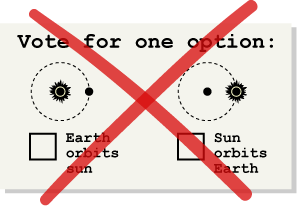 Science is not a popularity contest or a democracy. Scientists don’t vote on whether or not to accept a scientific idea, but neither is science authoritarian. In science, evidence — not a supreme leader or popular opinion — determines which ideas are accepted. Scientific ideas are judged based on the evidence supporting or contradicting them. Even a hypothesis that is appealing to many scientists will be rejected if it is not supported by evidence.
Science is not a popularity contest or a democracy. Scientists don’t vote on whether or not to accept a scientific idea, but neither is science authoritarian. In science, evidence — not a supreme leader or popular opinion — determines which ideas are accepted. Scientific ideas are judged based on the evidence supporting or contradicting them. Even a hypothesis that is appealing to many scientists will be rejected if it is not supported by evidence.
Though scientists don’t vote on the validity of scientific ideas, they are sometimes asked to vote on other issues in science, like terminology. In 2006, for example, astronomers in the International Astronomers Union voted on what sort of heavenly bodies should be considered planets. This vote dealt with how to use a particular scientific term — not with the validity of a scientific idea (e.g., the reason that planets orbit stars, the path of Pluto, or its size). The much-publicized outcome of this lexical debate ended up demoting Pluto from its status as a planet. But the real science here — Pluto itself, its movement, history, and future — remains unchanged by whatever earthbound astronomers choose to call it.
For more on the misconception that science is democratic, visit Misconceptions about science.
